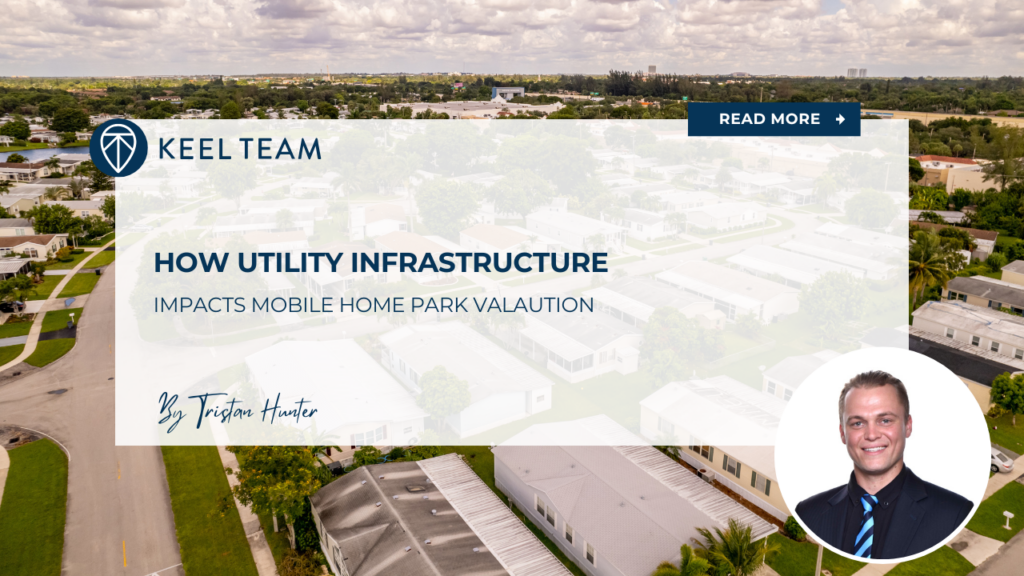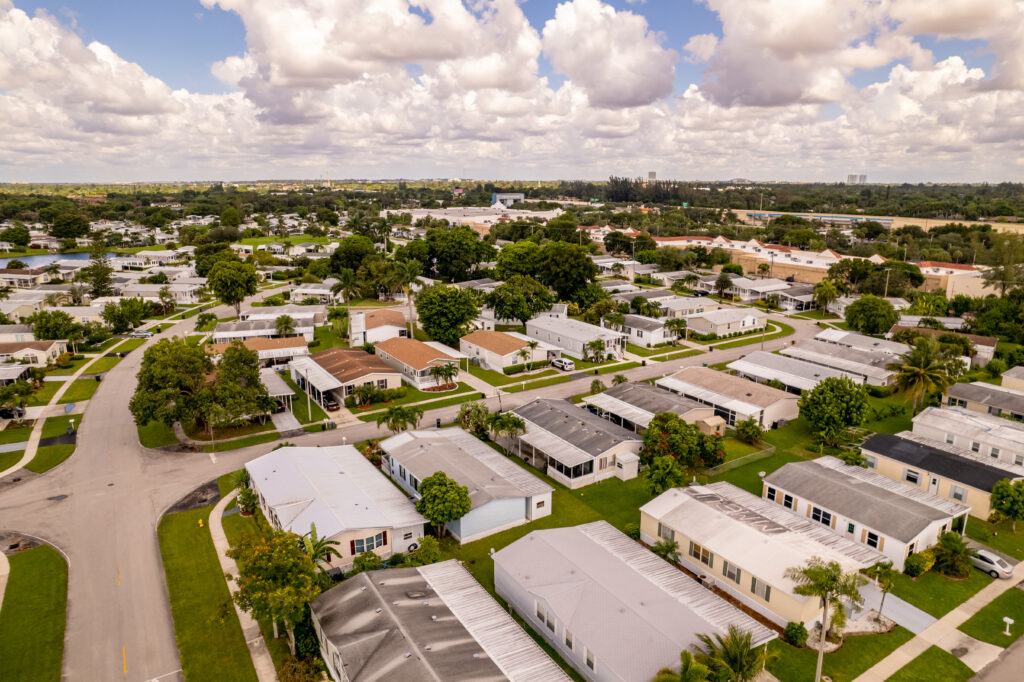How Utility Infrastructure Impacts Mobile Home Park Valuation
-
 Tristan Hunter - Investor Relations
Tristan Hunter - Investor Relations

Mobile home park investing often looks attractive because of strong cash flow potential. But behind every deal, infrastructure tells a deeper story. One of the most overlooked value drivers in mobile home park acquisitions is utility infrastructure. The way utilities are set up can dramatically influence a deal. Being one of the most expensive land improvements in this space, it can directly impact mobile home park valuation. Investors often underestimate the impact utilities have on operations, risk, and long-term maintenance. Understanding this piece is essential before closing on any mobile home park deal. Let’s jump in!
Why Utilities Matter to Mobile Home Park Investors
Utilities are tied to both operational costs and risk. They often determine how stable the income stream may be.
A mobile home park with low operating costs and predictable utility billing can appear more attractive to investors. This often translates into higher valuation. On the flip side, complex or aging systems can require costly repairs, reducing net income and, by extension, market value.
Every utility—water, sewer, gas, and electric—adds a layer of either confidence or concern to your underwriting.
Private vs. Public Utilities
One of the first things to look at is whether utilities are public or private.
Public utilities are provided and maintained by the local municipality. In most cases, these systems include city water and sewer. Investors often prefer public utilities because of reduced responsibility. If there’s a water main break or sewer backup, the city typically handles it.
Private utilities, on the other hand, are owned and managed by the mobile home park owner. Examples include well water, septic systems, and private electrical systems. These systems can work well, but they usually carry higher risk and maintenance costs.
Private systems may require more regular inspections and potential capital expenditures. A well going dry or a septic failure could cause major disruptions and expenses.
For this reason, mobile home parks with all-public utilities might trade at lower cap rates, reflecting their perceived lower risk.
Download our FREE eBook on the Top 20 things to know BEFORE investing in mobile home parks!
Submetered vs. Master-Metered Utilities
Utility billing also plays a major role in valuation.
Master-metered utilities are when the mobile home park owner receives one bill for the entire property. Tenants are either charged a flat fee or the owner absorbs the cost.
Submetered utilities allow owners to bill tenants based on individual usage. Submetering is generally favored by investors because it passes utility costs onto tenants.
Here’s why that matters:
- It usually lowers operating expenses
- It encourages tenants to conserve resources
- It can create more predictable cash flow
From a valuation perspective, lower expenses often mean a higher net operating income (NOI). Since mobile home park valuation is usually based on NOI, submetered systems can lead to higher valuation potential.
Water and Sewer Infrastructure
Water and sewer systems are arguably the most important components in utility infrastructure.
A mobile home park on city water and sewer may require fewer ongoing repairs and less oversight. These systems often allow for easier tenant billing through submeters.
In contrast, well and septic systems typically require more diligence.
Wells must be regularly tested for water quality. Pumps, tanks, and filters need maintenance. Septic systems must be pumped and inspected. Failing systems may require full replacement, which can cost tens of thousands of dollars.
These risks often reduce the price investors are willing to pay for a mobile home park with private systems.
However, not all private systems are problematic. Some are well-maintained and compliant with regulations. Investors just need to factor in the potential costs and risks before making an offer.
Electric and Gas Infrastructure
Electricity and gas also affect valuation, though often less dramatically than water and sewer.
Mobile home parks may have one of two setups:
- Direct-billed utilities, where tenants have accounts with the utility company
- Park-owned systems, where the mobile home park owner bills tenants or includes usage in rent
Direct-billed systems are often easier to manage and present lower liability. Utility companies handle outages, repairs, and billing disputes.
If the mobile home park owns the electric or gas lines, more responsibility falls on the operator. Maintenance, safety compliance, and billing become your job. This added complexity might lead to lower valuation unless the system is modern and problem-free.
Capital Expenditures and Deferred Maintenance
When evaluating a mobile home park, always ask about recent utility repairs or upgrades. Deferred maintenance on a water or sewer system could impact valuation.
Buyers might require a lower purchase price to account for the cost of upgrades. Alternatively, a recently replaced system could increase buyer confidence and justify a stronger offer.
Capital expenditures like:
- Replacing galvanized water lines
- Upgrading septic systems
- Installing submeters
- Fixing drainage issues
…all play into how an asset is priced. If the infrastructure is modern, efficient, and well-documented, valuation may be positively affected.

Regulatory Considerations
Some states regulate private utility systems more heavily than others. A mobile home park with a private water system may be subject to Department of Environmental Quality (DEQ) reporting.
If the owner isn’t compliant, it could delay financing or even require immediate remediation. That introduces risk, which could lower valuation.
Make sure to factor in any permitting, reporting, or regulatory obligations tied to the utilities. These obligations may not appear on a rent roll, but they can significantly impact the mobile home park’s financial picture.
How Utilities Impact Financing
Utility infrastructure not only affects investors, but it also matters to lenders.
Banks often prefer mobile home parks with public utilities and direct-billed setups. These can reduce operational risk and improve cash flow reliability.
If a mobile home park has aging private utilities, lenders may reduce the loan-to-value ratio or increase interest rates. Some lenders might even decline financing altogether.
This financing friction can limit your buyer pool when it comes time to sell, which in turn affects the property’s market value.
Takeaways for Mobile Home Park Investors
Utility infrastructure plays a key role in mobile home park valuation. Here’s a recap:
- Public utilities are often viewed as more favorable than private systems
- Submetered utilities may increase NOI and valuation
- Aging systems can result in higher cap rates and reduced offers
- Infrastructure impacts financing options and lender interest
- Upgrades and documented maintenance can improve valuation
Each mobile home park deal is different. A thorough review of the utility setup should be part of every due diligence checklist. By understanding how utility infrastructure ties into valuation, investors can generally avoid surprises and structure better deals.
Are you looking for MORE information? Book a 1-on-1 consultation with Andrew Keel to discuss:
- A mobile home park deal review
- Due diligence questions
- How to raise capital from investors
- Mistakes to avoid, and more!
Disclaimer:
The information provided is for informational purposes only and is not investment advice or a guarantee of any kind. We do not guarantee profitability. Make investment decisions based on your research and consult registered financial and legal professionals. We are not registered financial or legal professionals and do not provide personalized investment recommendations.

Tristan Hunter - Investor Relations
View The Previous or Next Post
Subscribe Below 👇





